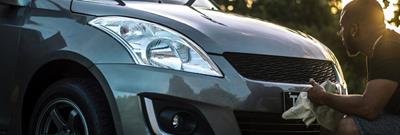
Most of us have heard of the 2030 ban on the sale of new petrol and diesel cars without grappling with the details. Here, we run through the questions that matter so you can feel prepared for cleaner, greener travel.
EASY AS HACK
Rather than rush to buy a new electric car before the 2030 ban, wait to see the prices fall. The cost of electric cars is set to come down over time as batteries cost less to produce.
At a glance
- You won’t be able to buy a new petrol or diesel car from 2030, or a new hybrid car from 2035
- You’ll still be able to buy used petrol or diesel cars after 2030 and used hybrid cars after 2035
- Currently, there are no plans to stop car owners from driving petrol and diesel cars on public roads after 2030
What does the ban on petrol and diesel cars mean?
The 2030 ban on petrol and diesel cars applies to the sale of new vehicles, rather than a total ban of petrol and diesel cars on the roads. In other words, you won’t be able to buy a new petrol or diesel car from 2030.
Although the rule comes into effect from 2030, it will probably become more difficult to find new petrol and diesel cars before then.
With the petrol and diesel ban looming, manufacturers and dealers are likely to concentrate on selling electric cars before the law changes.
Why are petrol and diesel cars being banned?
The Government introduced the 2030 ban as an ‘historic step’ to ending the UK’s contribution to climate change and believes it will help to improve air quality in towns and cities across the country [1].
Transport accounted for 25% [2] of the UK’s greenhouse gas emissions in 2021, with journeys made by road making up most of the pollution. Reducing emissions from exhausts in the short term, pretty much guarantees we can all breathe cleaner air, sooner rather than later.
How will the petrol and diesel ban affect me?
Other than clean the air that you breathe, the 2030 ban might mean that you buy an electric car sooner than you think.
Manufacturers are likely to build more electric cars and dealerships are more likely to push electric cars, the closer we get to the 2030 deadline. The Government has set a target of zero-emissions cars making up 22% of all new sales by 2024, 38% of sales by 2027 and 80% in 2030 [3].
|
Year |
Target |
Year |
Target |
|---|---|---|---|
|
2024 |
22% |
2030 |
80% |
|
2025 |
28% |
2031 |
84% |
|
2026 |
33% |
2032 |
88% |
|
2027 |
38% |
2033 |
92% |
|
2028 |
52% |
2034 |
96% |
|
2029 |
66% |
2035 |
100% |
The chances of finding a new petrol or diesel car will become slimmer over time and could mean you ‘go electric’ before the ban.
As of September 2023, electric cars are exempt from road tax. However, the exemption will end in April 2025 [4].
Whether the value of used petrol and diesel cars holds or falls, depends largely on the electric car situation. For example, if public charger availability isn’t met, it’s likely that nearly new petrol and diesel cars will be a popular choice and this will drive up resale costs.
Don’t miss: A beginner’s guide to electric cars
Will hybrid cars be banned too?
The sale of new hybrid cars will be banned from 2035 [5]. Like diesel and petrol cars, you’ll still be able to drive hybrid cars after the ban.
Will I still be able to buy a petrol or diesel car after 2030?
Yes. If you’re buying a petrol or diesel car registered before 2030, you’ll be fine.
Will I still be able to drive a petrol or diesel car after 2030?
Yes. There are no plans to ban petrol and diesel cars from being driven on public roads in the UK.
However, it’s worth keeping in mind that Clean Air Zones like those in London (ULEZ), Birmingham and Bristol, might be rolled out to more parts of the country and charge drivers for using petrol and diesel cars.
Check this out: Five of the best apps for electric car owners
Is the petrol and diesel ban going ahead?
Although the Prime Minister asked for ‘more flexibility’ in the planning of the 2030 deadline, Levelling-Up Secretary Michael Gove described the 2030 date as ‘immovable’ [6].
It looks like the 2030 ban is here to stay.
Can I get a grant to buy a new electric car?
Only some types of electric vehicles are eligible for a government grant, including wheelchair accessible vehicles, motorcycles, mopeds, vans, trucks and taxis [7].
You might be able to get financial help towards installing an electric car charger in your home. Check the criteria for the EV charge point grant.
Are there enough public charging points?
The Government predicts that the UK needs 300,000 public electric car chargers by 2030 to keep up with demand [8]. According to Zapmap, at the end of July 2023, there were 45,737 available [9].
Let’s hope that installing an extra 250,000+ chargers in less than 7 years is possible.
Protect your vehicle
with car insurance that’s Defaqto Five Star Rated.
Sources
[1] https://www.gov.uk/government/news/government-takes-historic-step-towards-net-zero-with-end-of-sale-of-new-petrol-and-diesel-cars-by-2030
[2] (p.65) https://assets.publishing.service.gov.uk/government/uploads/system/uploads/attachment_data/file/1147457/powering-up-britain-net-zero-growth-plan.pdf
[3] (p.22) https://assets.publishing.service.gov.uk/government/uploads/system/uploads/attachment_data/file/1154610/zev-mandate-co2-emissions-regulation-consultation-document.pdf
[4] https://www.gov.uk/government/publications/introduction-of-vehicle-excise-duty-for-zero-emission-cars-vans-and-motorcycles-from-2025/introduction-of-vehicle-excise-duty-for-zero-emission-cars-vans-and-motorcycles-from-2025
[5] https://www.gov.uk/government/news/government-takes-historic-step-towards-net-zero-with-end-of-sale-of-new-petrol-and-diesel-cars-by-2030
[6] https://www.thetimes.co.uk/article/sunak-sticking-to-2030-ban-on-sales-of-new-petrol-cars-cjsf37kjt
[7] https://www.gov.uk/plug-in-vehicle-grants
[8] https://assets.publishing.service.gov.uk/government/uploads/system/uploads/attachment_data/file/1065576/taking-charge-the-electric-vehicle-infrastructure-strategy.pdf
[9] https://www.zap-map.com/ev-stats/how-many-charging-points


